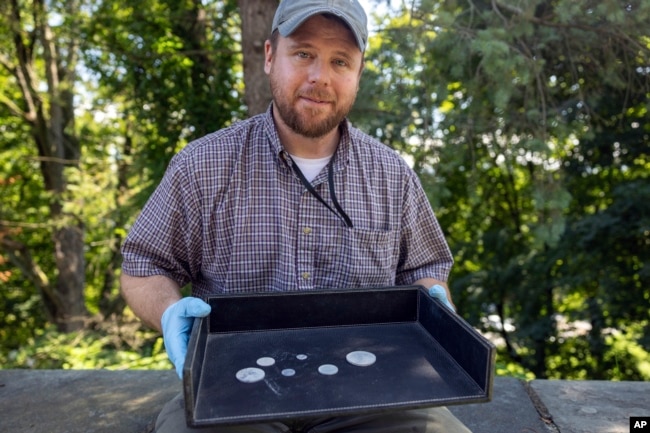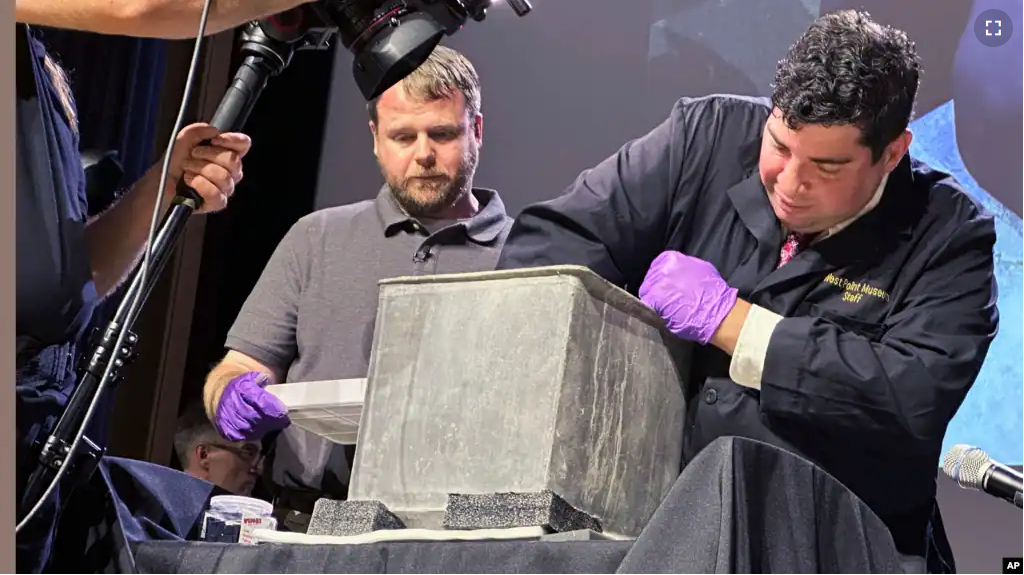Officials at the U.S. Military Academy West Point in New York state recently opened a time capsule that is 195 years old live on the internet.
The event on August 28 caused disappointment because the container appeared to contain nothing more than dirt. But West Point officials said last Wednesday that the box did contain hidden treasure after all.
A time capsule is a container that is filled with objects and buried or hidden. The capsule is meant to be opened by people living many years in the future.
The lead box is believed to have been put in place by West Point military students. It was discovered inside the base of a memorial to Revolutionary War hero Thaddeus Kosciuszko.
The capsule contained six silver American coins dating from 1795 and 1828 and a medal, West Point said in a news release. The ceremonial opening of the box happened at the military school in New York state.
Speaking of the event, West Point archeologist Paul Hudson said: “When I first found these, I thought, man, you know, it would have been great to have found these on stage.” After the opening, he took the box back to his laboratory and began carefully looking through the remains.

He said he then found the edge of a coin in the dust inside the box. “I thought, well that’s OK. That’s something, that’s a start,” Hudson said.
He said he felt let down like everyone else by the lack of results from the live opening. The crowd that gathered at the U.S. Military Academy hoped to see historical military objects or documents when experts opened the top and pointed a camera inside.
It was probably better to remove the coins and medal in a controlled setting, added Hudson. He still plans to study the remains for possible answers to what else might be inside.
It appears that moisture and possibly dirt entered the box through a damaged edge. The conditions could have destroyed materials like paper or wood.
What did survive was a five-cent coin from the year 1795, an 1800 Liberty Dollar, an 1818 25-cent coin, 10-cent, and 1-cent coins from 1827, and an 1828 50-cent coin. There was also a medal remembering the Erie Canal from 1826.
The discoveries seem to confirm school officials’ theory that the box was put in place by military students in 1828 or 1829. The monument to Kosciuszko, which included a statue of him, was completed at about that time.
A group of five military students, or cadets, was involved in the ceremony dedicating the monument. One of them was U.S. Civil War general Robert E. Lee who graduated in 1829.
Kosciuszko had designed wartime fortifications for the Continental Army at West Point during the Revolutionary War. He died in 1817. The statue of Kosciuszko was added to the monument in 1913.
The historical preservation and research of the time capsule will continue.
“I think there’s more that we can learn from this,” Hudson said.
I’m Gregory Stachel.
Carolyn Thompson reported this story for The Associated Press. Gregory Stachel adapted the story for VOA Learning English.
______________________________________________________
Words in This Story
time capsule –n. a container that is buried or hidden which is filled with objects from a certain time and is meant to be opened by future generations
coin – n. a small, flat, and usually round piece of metal issued by a government as money
archeology – n. a science that deals with past human life and activities by studying the bones or tools of ancient people
moisture – n. a small amount of a liquid (such as water) that makes something wet or moist
cent – n. a unit of money that is equal to 1/100 of the basic unit of money in many countries
dedicate –v. to officially show that a place is meant for honoring or remembering a person, event or action
fortification – n. the act of building military defenses to protect a place against attack
preserve – v. to keep (something) in its original state or in good condition
